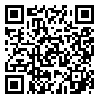BibTeX | RIS | EndNote | Medlars | ProCite | Reference Manager | RefWorks
Send citation to:
URL: http://jdisabilstud.org/article-1-2034-en.html
Background and Objectives: When adolescents cannot successfully overcome transformational crises and challenges, they experience psychological distress and deviation from normal daily life and its emotional, social, and cognitive consequences. One of the issues studied in this period is the adaptation of adolescents. Social adjustment is the ability to interact with others in a specific context that is acceptable and valuable by society. One of the factors that can affect people's psychological well-being is psychological security. Security is a feeling of personal worth, assurance, self-confidence, and acceptance by the group. Empathy training provides positive feedback for the people by increasing their understanding, improving their awareness of themselves and others, increasing empathic responses by using emotion regulation, and adopting a perspective that leads to increased accuracy in empathy. The present study aimed to determine the effectiveness of empathy skills training on social adjustment and psychological security of senior high school students in Assaluyeh City, Iran.
Methods: The method of the present study was quasi-experimental with a pretest-posttest design with a control group. The statistical population included all senior male high school students in Assaluyeh City in the academic year 2019-20. Using the available sampling method, from among the eligible volunteers, a sample of 30 people was selected (15 people in the experimental group and 15 people in the control group). The inclusion criteria comprised the ability to communicate with other group members, interest in participating in the research, and coordinate the class schedule with the meeting schedule. The exclusion criteria comprised having a mental or physical disorder affecting the skills training process, attending psychotherapy sessions, or counseling elsewhere simultaneously. The experimental group received eight hours of training in eight sessions. However, no intervention was provided for the group. Social Adjustment Scale (Bell, 1961) and Safety-Immunity Inventory (Maslow et al., 1952) were used to collect the study data. The univariate analysis of covariance was used to analyze the data. To describe the data, central and dispersion indices such as mean and standard deviation were used. For data analysis, multivariate covariance analysis and independent t test were used. The mentioned statistical analyses were done in SPSS version 22 software. The significance level of the tests was considered 0.05.
Results: The findings showed that after modifying the pretest scores, empathy skills training improved social adjustment (p=0.005) and psychological security (p=0.007) of Assaluyeh high school male students. The effect size of the intervention on improving the variables of social adjustment and psychological security was obtained as 0.75 and 0.70, respectively.
Conclusion: Based on the study findings, empathy skills training has improved social adjustment and psychological security in senior high school male students.
| Rights and permissions | |
 |
This work is licensed under a Creative Commons Attribution-NonCommercial 4.0 International License. |



